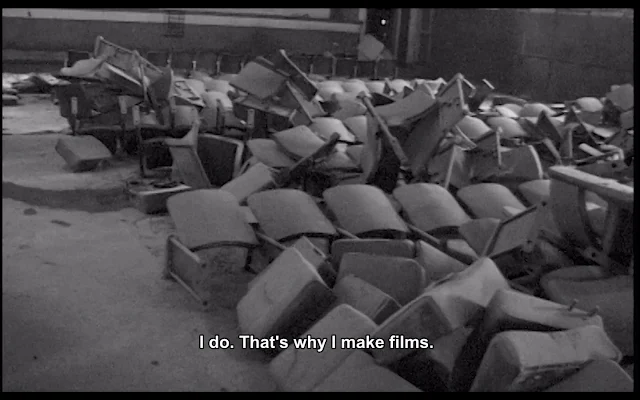Chad is one of the poorest countries on Earth, perpetually dragged down by corruption and ravaged by civil war, so you wouldn't expect it to have a thriving film industry. And it doesn't, as Mahamat-Saleh Haroun discovers when his mother's death prompts him to return to his native country after a 10-year exile in France learning his craft as a filmmaker. All of the theaters he knew while growing up are shuttered and fallen into ruins. Video has replaced the once-communal experience of moviegoing. A deep-seated prejudice against film as "stealing your image" has taken hold in part of the country, along with an ignorance about the distinction between acting and being, as he learns when he seeks out an actress who played the part of a woman with HIV in one of his films. She has been shunned by her community and family. Yet Haroun persists, trying to make a movie while he's in Chad, only to be thwarted by a lack of funding and an absence of a system of distribution for films. Haroun plays himself in this docudrama, a provocative portrait of not only a country but also the possible dark future for the art of cinema.
A blog formerly known as Bookishness / By Charles Matthews
"Dazzled by so many and such marvelous inventions, the people of Macondo ... became indignant over the living images that the prosperous merchant Bruno Crespi projected in the theater with the lion-head ticket windows, for a character who had died and was buried in one film and for whose misfortune tears had been shed would reappear alive and transformed into an Arab in the next one. The audience, who had paid two cents apiece to share the difficulties of the actors, would not tolerate that outlandish fraud and they broke up the seats. The mayor, at the urging of Bruno Crespi, explained in a proclamation that the cinema was a machine of illusions that did not merit the emotional outbursts of the audience. With that discouraging explanation many ... decided not to return to the movies, considering that they already had too many troubles of their own to weep over the acted-out misfortunes of imaginary beings."--Gabriel García Márquez, One Hundred Years of Solitude
Search This Blog
Thursday, July 25, 2024
Bye Bye Africa (Mahamat-Saleh Haroun, 1999)
Cast: Mahamat-Saleh Haroun, Garba Issa, Aïcha Yelena, Akabar Mahamat-Saleh, Khayar Ouma Defallah, Abderamane Koulamallah, Issa Serge Coelo, Sophie Barrand. Screenplay: Mahamat-Saleh Haroun. Cinematography: Mahamat-Saleh Haroun, Stéphane Legoux, Robert Millié. Film editing: Mathilde Boussel, Sarah Taouss-Maton.







